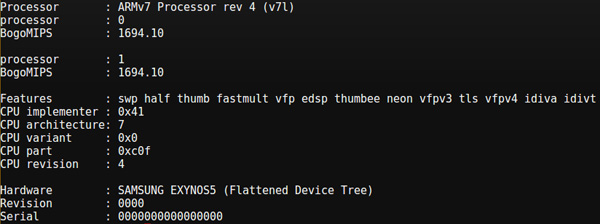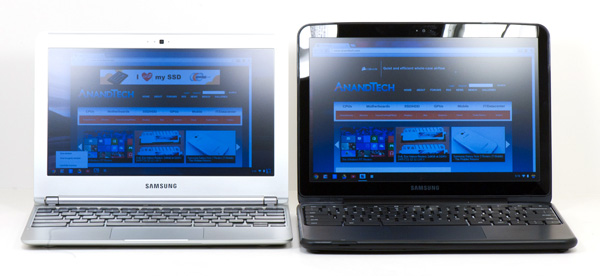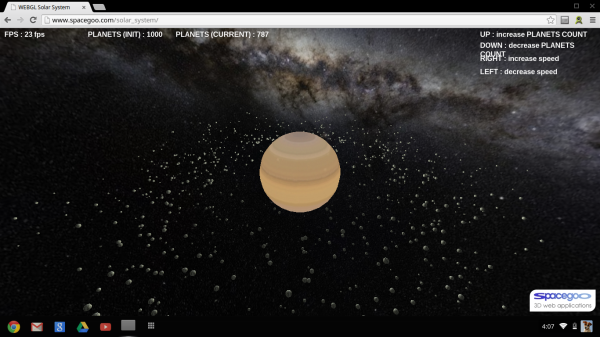Samsung Chromebook (XE303) Review: Testing ARM's Cortex A15
by Anand Lal Shimpi on October 31, 2012 9:00 AM ESTPerformance: Atom vs. ARM's Cortex A15
In our iPhone 5 review I included this crude diagram comparing the high level micro-architecture layouts of the current crop of mobile CPU cores. While most of the cores looked fairly similar, the one to really stand out is ARM's Cortex A15. A three issue, OoO core, the Cortex A15 was designed to put ARM in a completely new performance category.

For 2013, the Cortex A15 is expected to be the ARM CPU core of choice for the next wave of smartphone and tablet SoCs. NVIDIA's Wayne should integrate multiple Cortex A15s as well as competing solutions from Samsung and TI. Samsung's Exynos 5 Dual, found in the new Chromebook, integrates two ARM Cortex A15 cores running at 1.7GHz. As our first experience with a Cortex A15, I wanted to get a good idea for how it would compare to Intel's Atom. And now me comparing to the older Chromebook 500 makes sense. The Atom N570 in the older Chromebook is the closest approximation we have to the currently shipping Atom based mobile SoCs. There are a number of enhancements to the newer chips (particularly when it comes to power consumption), but the base core is very similar. It's clear that the Sandy Bridge Celeron based Chromebook is faster than this new Cortex A15 design, but how about the old dual-core Atom model?

As Chrome OS is built around the Chrome browser, our tests had to be largely JavaScript based unfortunately. The good news is that even given the nature of the benchmarks, we're able to get a good feel for performance between the two SoC platforms. Both systems were running the latest version of Chrome OS at the time of publishing.
| Samsung Chromebook Performance Comparison | ||||||
| SunSpider 0.9.1 | BrowserMark | RIABench Focus Tests | Kraken | |||
| Atom N570 1.66GHz | 1034.3 ms | 152780 | 1968 ms | 14229.5 ms | ||
| Exynos 5 Dual 1.7GHz | 690.5 ms | 217031 | 1192 ms | 9733.2 ms | ||
The Cortex A15 is fast. Across the board we're seeing a 40 - 65% increase in performance over a dual-core Atom. Although it's not clear how performance will be impacted as companies work to stick Cortex A15 based SoCs in smartphones with tighter power/thermal budgets, in notebooks (and perhaps even tablets) the Cortex A15 looks capable of delivering a good 1 - 2 generation boost over Intel's original Atom core.
The IE10 browser tests tend to agree with our JavaScript performance tests, although the CSS Maze Solver benchmark shows a huge advantage for ARM over Intel's Atom here.
| Samsung Chromebook Performance Comparison | ||||||
| IE10 Bubbles Test | IE10 Fishbowl | IE10 Maze Solver | ||||
| Atom N570 1.66GHz | 11 fps | 5 fps | 45 seconds | |||
| Exynos 5 Dual 1.7GHz | 17 fps | 8 fps | 17 seconds | |||
GPU performance is an even bigger advantage for the Exynos 5 Dual over Intel's old Atom N570 (GMA-3150 GPU). I ran three different webGL tests, each of which showed just how bad the old Atom GPU core was.
| Samsung Chromebook GPU Performance Comparison | ||||||
| WebGL Solar System | WebGL Cubes (500) | WebGL Aquarium (50) | ||||
| Atom N570 1.66GHz | 2 fps | 10 fps | 2 fps | |||
| Exynos 5 Dual 1.7GHz | 22 fps | 28 fps | 38 fps | |||
This comparison isn't really all that fair as the newer Atom cores use Imagination GPUs, although even then they are using relatively underpowered solutions compared to what Samsung is shipping on the Exynos 5 Dual.
The more relevant conclusions here apply to the CPU comparison. Next year Intel is expected to introduce its first new Atom core since the platform's introduction five years ago. The new architecture will bring an Out of Order execution core as well as a tangible performance increase. The question is whether or not this will be enough to fend off advances from Cortex A15 based designs.

The new Chromebook (left) vs. the old Atom based Chromebook (right)
In our Surface review I looked at Clovertrail Windows 8 tablet performance and put it a good 40%+ faster than NVIDIA's Tegra 3. If ARM's Cortex A15 is able to outperform Clovertrail by a similar margin, it could make the next generation of Windows RT tablets even more attractive. Keep in mind that we're looking at an older Atom platform here and not Clovertrail, so the performance deltas could shrink a bit.











149 Comments
View All Comments
TrackSmart - Wednesday, October 31, 2012 - link
I think netbooks are the more obvious comparison. You can buy Intel/AMD powered netbooks running Windows/Linux for $200 and up. The "better" choice depends on just how basic your computing needs are and how much you can live with a cloud-based operating system.Krysto - Thursday, November 1, 2012 - link
Browsing on them will be much slower, especially on those single core ones that cost $200. I know because I've used one. Single core Atom browsing on a netbook is excruciatingly painful. Plus, I believe I saw in a Cnet review that this Chromebook has higher performance in browsing than IE9 with a Core 2 Quad. That's not a very fair comparison because it used IE9, but still.TrackSmart - Thursday, November 1, 2012 - link
I wasn't advocating one or the other, just pointing out the obvious comparison is not between used laptops and chromebooks, but between chromebooks and other "netbook-like" laptops.It's a tradeoff between running a lightweight, but very limited operating system (Chrome) or a heavier but full-featured and mature operating system (Windows or Linux). Performance versus greater availability of features and software.
I've also used single core atom netbooks and found them painfully slow. I haven't used the newer dual core Atom or dual core AMD-based netbooks that are more common these days. I'm guessing they are similarly painful, given that single-threaded performance is the major limitation for light workloads.
Jumangi - Wednesday, October 31, 2012 - link
Chromebook...a "solutiion" still in search for a problem/market to serve.Peroxyde - Wednesday, October 31, 2012 - link
Can you please clarify how the Chromebook perform the following tasks in offline mode?1. Can I work and save documents when not connected to the Internet?
2. Is it possible to play music or video files stored on the SD Cards? What media formats are supported? (MP3, MP4, MKV?)
3. Can the Chromebook access media files over the LAN, via DLNA client or SAMBA shares?
Thanks in advance for any help.
FormulaRedline - Wednesday, October 31, 2012 - link
I'm also interested in this. The review doesn't seem to go at all into the required internet connection and how this affects functionality. Unfortunately, we don't yet live in a world with free WiFi everywhere.Selden - Wednesday, October 31, 2012 - link
Offline YESA/V YES (but not all formats)
Samba NO
ddy - Saturday, November 17, 2012 - link
I want to ask if there is smb, already using the Samsung ARM Chromebook. I have a performance issue on working with Google docs. As you asked about the documents, I wanted to be involved.It is not that sensitive to respond, neither on-line nor offline. Does any of you have a similar problem??
Thanks in advance.
StormyParis - Wednesday, October 31, 2012 - link
Nice review, thanks.I'd have liked more info about offline use though. Even if I'm online most of the time, it's very important that i can also be productive, and entertained, while offline.
prophet001 - Wednesday, October 31, 2012 - link
The ultimate digital pick-pocket.